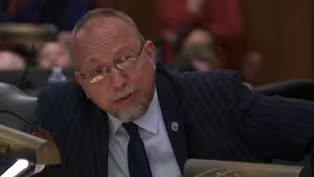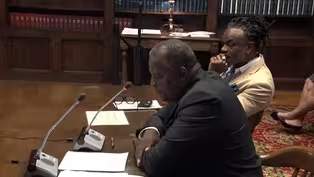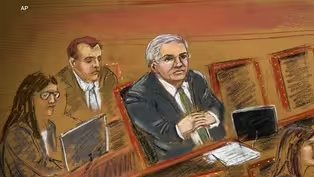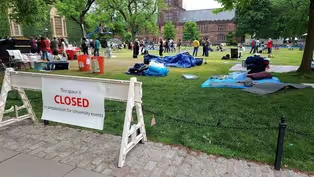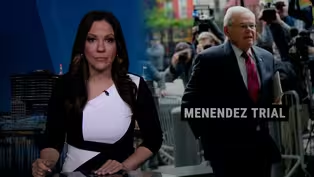NJ Spotlight News
NJ lawmakers pass restrictions on access to public records
Clip: 5/14/2024 | 6m 3sVideo has Closed Captions
Lawmakers agreed to changes that will make it tougher to access to government documents.
Democratic lawmakers are being slammed for pushing through a bill on Monday that rewrites the state’s open public records law. They agreed to more than a dozen changes that will make it tougher for people to get access to government documents. NJ Spotlight News reporter Colleen O'Dea shares more details.
Problems playing video? | Closed Captioning Feedback
Problems playing video? | Closed Captioning Feedback
NJ Spotlight News is a local public television program presented by THIRTEEN PBS
NJ Spotlight News
NJ lawmakers pass restrictions on access to public records
Clip: 5/14/2024 | 6m 3sVideo has Closed Captions
Democratic lawmakers are being slammed for pushing through a bill on Monday that rewrites the state’s open public records law. They agreed to more than a dozen changes that will make it tougher for people to get access to government documents. NJ Spotlight News reporter Colleen O'Dea shares more details.
Problems playing video? | Closed Captioning Feedback
How to Watch NJ Spotlight News
NJ Spotlight News is available to stream on pbs.org and the free PBS App, available on iPhone, Apple TV, Android TV, Android smartphones, Amazon Fire TV, Amazon Fire Tablet, Roku, Samsung Smart TV, and Vizio.
Providing Support for PBS.org
Learn Moreabout PBS online sponsorshipDemocrats are also taking hits for pushing through a bill on Monday that rewrites the state's open public records law, agreeing to more than a dozen changes that will make it tougher for people to get access to government documents.
The vote was cast after zero debate on the floor and no comment from lawmakers who refused to vote.
When all was said and done, critics in Trenton said this isn't a bill that modernizes OPRA but decimates it.
Senior writer Colleen O'Dea was covering the vote and joins me now with the details.
Colleen, good to have you on.
A lot to get through here.
So let me start with first, what are the changes that the lawmakers agreed to in what is now a bill heading to Governor Murphy's desk?
So there are a whole host of changes.
The bill is better than it was when it was first introduced back in March, and it's better than the initial amendments that were discussed early last week, but it still does.
I mean, we came up with about a dozen ways that it would still make it harder for people to get records.
Among those, I call it the Goldilocks provision.
If you've got too much detail in there and the clerk has to do some searching, it could be a denial.
If you don't have enough information there and you're too vague, could be a denial.
Kind of like you need that just right amount of information.
So, you know.
Yeah.
I mean, does it close the loopholes?
I mean, lawmakers, when they set out to do this, said there were too many loopholes that allowed for, you know, commercial enterprises to take advantage of this and essentially get clerks and mayors and the like to do their work for them.
Does it actually address that or does it make it more difficult to access these records?
Yeah, you got it.
It's it's the latter.
Any any mention and any specifics regarding data brokers and commercial entities were taken out of the bill.
I'm assuming and I'm not a lawyer, that's because if you provide access to documents, you can't stop one group of people or organizations from getting them.
But the benefit that they actually get and they get a better benefit than anybody else, journalists included, is that they could agree to pay more money to get their requests fulfilled faster.
So if you're a commercial organization, a clerk could could take 14 days to respond to you instead of seven.
In the real world, you don't get responses after ten days anyway.
But but if you're a commercial business, you could you could say, yes, I'll pay more money.
And you kind of go to the head of the line and you could get your request then, before anyone else.
Talk to me about how the vote went down.
Was this bipartisan?
Any surprises in terms of yes or no votes?
I mean, the the the in the legislature are going to call this bipartisan In fact, Senate President Nick Scutari did that yesterday, but I'm not sure you could call it bipartisan.
I mean, yes.
So you in the Senate, you had the bare minimum 21 voted yes.
Three of them were Republicans.
So you could say without the Republicans, they couldn't have put that bill passed Of course, they might have, you know, twisted a few arms.
Mostly Republicans voted in both houses against the bill.
In the Senate, we had only two votes against it.
That was Senators Wicker.
I apologize.
Three votes because something was changed after the initial vote.
Senators Zwicker, McKeon and Timberlake voted against it.
And in sadly, we had nine Democrats voted against it and they tended to be in districts that we think of as swing districts, districts, and we don't have many of them where these people might have a tough reelection fight, especially in the assembly.
That's next year.
But not everybody was in a swing district who voted no on the Democratic side and in the assembly, seven Republicans to get that 42 to 27 vote.
And again, without those Republican votes, the bill would not have passed.
What are watchdogs and other opponents saying?
Because I got a text early this morning from George Geist.
He's a former assemblyman and senator who worked with Loretta Weinberg in drafting the original legislation 20 years ago.
And he said this is not what we intended for this bill when we wrote it.
So what's the feedback then?
Yeah, and I saw Loretta also put out a statement where Senator Weinberg saying just how disappointed she was in particular that it was her party, the Democratic Party, that was driving this, that, you know, the Democratic Party that is has been for things like transparency in the past of advocates are saying that this is just in one word, somebody used this, decimate this law because it has so many.
I mean, they're not large, but there are a lot of tweaks that are going to make it harder for people to get information.
It's going to give give agencies greater agency, I guess I could say, to to deny requests.
And without the mandatory fee shifting, that was that is still the law, which essentially states that if you win your Oprah case, then the the agency that tonight has to pay your lawyer's fees.
Now, there is a a reasonable fee that would have to be paid, but only if you prove that it was a willful denial by an agency that may be a hard job or two.
So without those things, I think it could be really it's going to be difficult for people to get a records more difficult than it was.
In the governor's court.
Now, Colleen O'Dea, thanks so much.
Thank you very much, Bri.
Former state Sen. Ed Durr to run for governor
Video has Closed Captions
Clip: 5/14/2024 | 1m 4s | Durr is the third Republican candidate to enter the race (1m 4s)
Highlighting disparities in state contracting
Video has Closed Captions
Clip: 5/14/2024 | 4m 3s | Lawmakers hear testimony on ‘New Jersey Disparity Study’ (4m 3s)
Jury selection continues in Menendez corruption trial
Video has Closed Captions
Clip: 5/14/2024 | 5m 24s | Judge Sidney Stein interviewed prospective jurors away from the courtroom (5m 24s)
Princeton president orders pro-Palestine protesters to leave
Video has Closed Captions
Clip: 5/14/2024 | 4m 3s | President says protests 'would involve a significant and impermissible disruption...' (4m 3s)
Selecting jury in Menendez trial is an 'art and a science'
Video has Closed Captions
Clip: 5/14/2024 | 5m 12s | Interview: Brian Whisler, an attorney and former federal prosecutor (5m 12s)
Providing Support for PBS.org
Learn Moreabout PBS online sponsorshipSupport for PBS provided by:
NJ Spotlight News is a local public television program presented by THIRTEEN PBS
